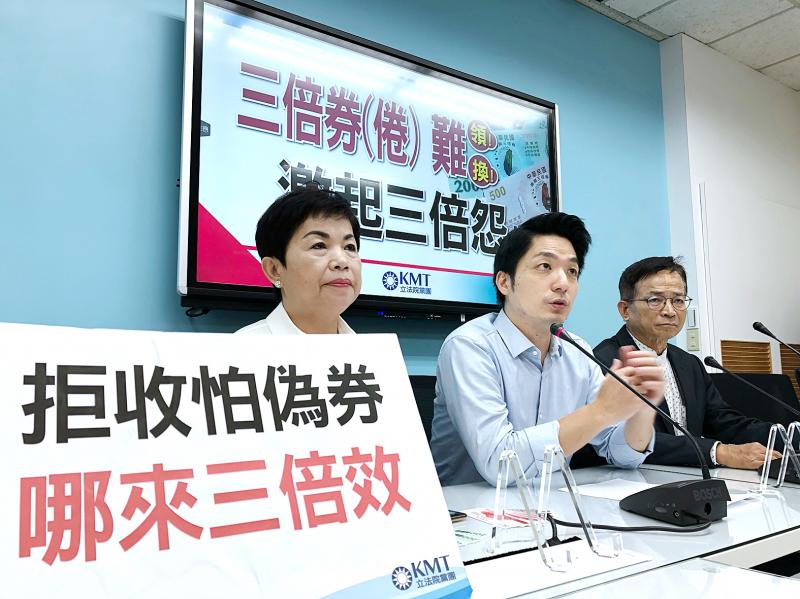The Chinese Nationalist Party (KMT) caucus yesterday criticized the Triple Stimulus Vouchers and highlighted several flaws in their design, including a lack of anti-counterfeiting features, which has reportedly discouraged some stores from accepting them.
People have had to wait in lines at convenience stores and post offices to purchase vouchers or claim those that they have ordered, and postal workers have had to work overtime, KMT caucus secretary-general Chiang Wan-an (蔣萬安) told a news conference in Taipei.
Street vendors who have not been unionized cannot cash in on the vouchers, while others have to worry about receiving counterfeit vouchers due to a lack of anti-counterfeiting features, he said.

Photo: CNA
Most people on online forums have said that they would use the vouchers to buy daily necessities, greatly reducing the economic stimulus effect the government expects the vouchers to have, he said, calling on Premier Su Tseng-chang (蘇貞昌) to immediately fix the problems.
Since the day they went on sale, the vouchers have caused people “triple inconvenience” and “triple frustration,” as evidenced by long lines at post offices and the overtime being paid to postal workers, which has reportedly topped NT$100 million (US$3.39 million), KMT Legislator Lai Shyh-bao (賴士葆) said.
Despite the Executive Yuan having given people the option of digital or paper-based vouchers, only 15 percent of people who have claimed the vouchers so far have opted for the paper-less version, he said.
Street vendors and food stand owners have to ask their market management committees to cash the vouchers for them, but not every market has such a committee, he said.
Some vendors have refused to take the vouchers to spare themselves the hassle they would have to go through to cash them, he said.
The Executive Yuan, which is today set to unveil a second special budget request for COVID-19 prevention relief and recovery, should allow local governments to manage the budget so that they can come up with their own ways to revitalize the economy, he said.
The Ministry of Culture, the Sports Administration and the Council of Agricultural have all introduced digital vouchers, which require people interested in them to enter a raffle draw by downloading apps, he said, adding that the draws are a way to divert the public’s attention from the poor functionality of the Triple Stimulus Vouchers.

A preclearance service to facilitate entry for people traveling to select airports in Japan would be available from Thursday next week to Feb. 25 at Taiwan Taoyuan International Airport, Taoyuan International Airport Corp (TIAC) said on Tuesday. The service was first made available to Taiwanese travelers throughout the winter vacation of 2024 and during the Lunar New Year holiday. In addition to flights to the Japanese cities of Hakodate, Asahikawa, Akita, Sendai, Niigata, Okayama, Takamatsu, Kumamoto and Kagoshima, the service would be available to travelers to Kobe and Oita. The service can be accessed by passengers of 15 flight routes operated by

GIVE AND TAKE: Blood demand continues to rise each year, while fewer young donors are available due to the nation’s falling birthrate, a doctor said Blood donors can redeem points earned from donations to obtain limited edition Formosan black bear travel mugs, the Kaohsiung Blood Center said yesterday, as it announced a goal of stocking 20,000 units of blood prior to the Lunar New Year. The last month of the lunar year is National Blood Donation Month, when local centers seek to stockpile blood for use during the Lunar New Year holiday. The blood demand in southern Taiwan — including Tainan and Kaohsiung, as well as Chiayi, Pingtung, Penghu and Taitung counties — is about 2,000 units per day, the center said. The donation campaign aims to boost

ENHANCING EFFICIENCY: The apron can accommodate 16 airplanes overnight at Taoyuan airport while work on the third runway continues, the transport minister said A new temporary overnight parking apron at Taiwan Taoyuan International Airport is to start operating on Friday next week to boost operational efficiency while the third runway is being constructed, the Ministry of Transportation and Communications said yesterday. The apron — one of the crucial projects in the construction of the third runway — can accommodate 16 aircraft overnight at the nation’s largest international airport, Minister of Transportation and Communications Chen Shih-kai (陳世凱) told reporters while inspecting the new facility yesterday morning. Aside from providing the airport operator with greater flexibility in aircraft parking during the third runway construction,

MORE FALL: An investigation into one of Xi’s key cronies, part of a broader ‘anti-corruption’ drive, indicates that he might have a deep distrust in the military, an expert said China’s latest military purge underscores systemic risks in its shift from collective leadership to sole rule under Chinese President Xi Jinping (習近平), and could disrupt its chain of command and military capabilities, a national security official said yesterday. If decisionmaking within the Chinese Communist Party has become “irrational” under one-man rule, the Taiwan Strait and the regional situation must be approached with extreme caution, given unforeseen risks, they added. The anonymous official made the remarks as China’s Central Military Commission Vice Chairman Zhang Youxia (張又俠) and Joint Staff Department Chief of Staff Liu Zhenli (劉振立) were reportedly being investigated for suspected “serious